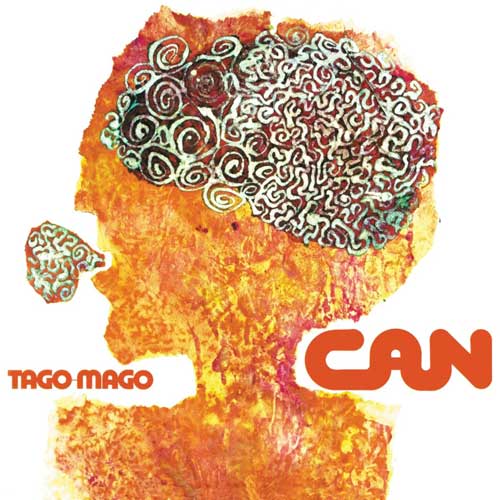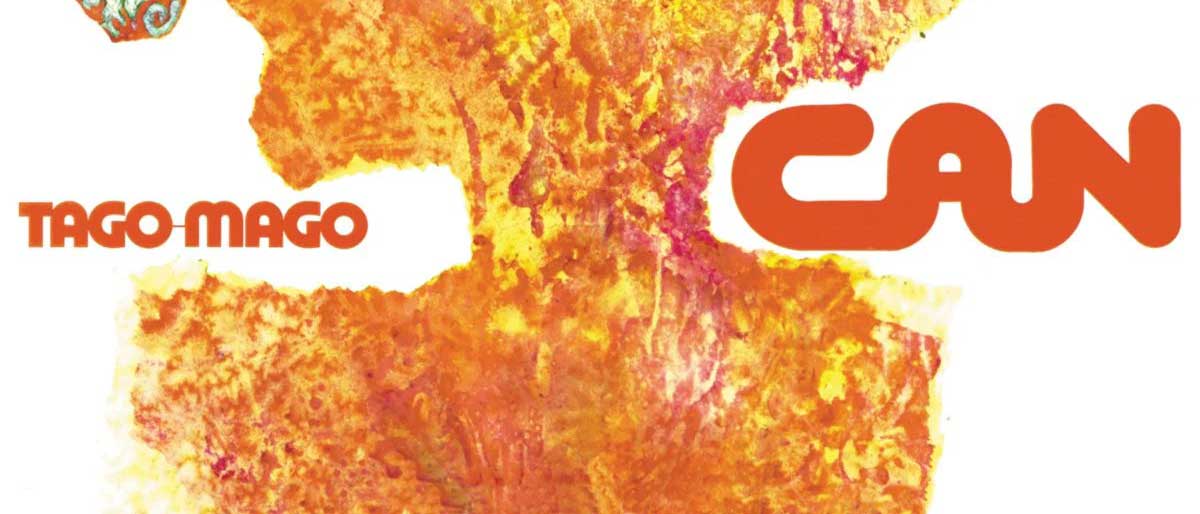You can trust Louder

Paperhouse
Mushroom
Oh Yeah
Halleluhwah
Aumgn
Peking O
Bring Me Coffee or Tea
Irmin Schmidt said that Can were “always aiming for the masterpiece”. But it was Tago Mago – the record John Lydon said inspired his entry into music – that set a lofty benchmark. “Tago Mago is a stunning album,” said Lydon. “In particular Halleluhwah, which lasts an entire side.”
In subsequent years Tago Mago would influence, among countless others, David Bowie, Julian Cope, Primal Scream, the Flaming Lips and hosts of electronic artists and avant gardists.
Their third album, Tago Mago was a display of occult strength spread across two discs, unleashing Halleluwah's monster-funk, Peking O’s sinister eruptions, and post-apocalyptic jukebox faves such as Oh Yeah and Bring Me Coffee Or Tea. The free-form Aumgn took up a side of the original double album, while Holgar Czukay’s micro-editing predated sampling by several years.
It was an album that realigned rock, commencing countdown for 21st-century music. Like music beamed down to Earth from some deeply peculiar planet, Can’s masterpiece remains deliciously alien but never less than utterly hypnotic.

Every week, Album of the Week Club listens to and discusses the album in question, votes on how good it is, and publishes our findings, with the aim of giving people reliable reviews and the wider rock community the chance to contribute.
Sign up below to get the latest from Classic Rock, plus exclusive special offers, direct to your inbox!

Other albums released in August 1971
- In Hearing of Atomic Rooster – Atomic Rooster
- Fillmore East – June 1971 - The Mothers of Invention
- Who's Next - The Who
- Surf's Up - The Beach Boys
- The Sun, Moon & Herbs - Dr. John
- If 3 - If
- A Space in Time - Ten Years After
- Sometimes I Just Feel Like Smilin' - Butterfield Blues Band
- White Light - Gene Clark

What they said...
"With the band in full artistic flower and Damo Suzuki's sometimes moody, sometimes frenetic speak/sing/shrieking in full effect, Can released not merely one of the best Krautrock albums of all time, but one of the best albums ever, period. Tago Mago is that rarity of the early '70s, a double album without a wasted note, ranging from sweetly gentle float to full-on monster grooves." (AllMusic)
"Tago Mago is seven songs in 73 minutes; the first half is big-beat floor-fillers, the second half yanks the floor away. For those first four songs, drummer Jaki Liebezeit is the star of the band, setting up rhythmic patterns of his own devising (isolate his part of almost any Can song, and you'd immediately know what you were listening to) and repeating them like mantras." (Pitchfork)
"While Aumgn is a blueprint for what ambient music would look like 30 years later, Peking O‘s bouncing, unconventional structure is tough to gather. More than a song, it’s a ritual: terrifying screams, beats coming from some weird drum-machine, unintelligible babbling words, organs and synths make the listener feel halfway between a Hitchcock movie and a black mass." (Soul Feeder)

What you said...
Uli Hassinger: Being German I‘m glad that a masterpiece of Krautrock has been brought up. From today's point of view it’s certainly not music for the masses. Back in the 70s it was different to a certain extent.
Krautrock often ignored traditional song structures and catchy melodies, and songs were frequently extended to fill the whole side of a record. Tago Mago is the best example of this.
The album was very influential for later electronic or rock musicians. It’s the musical equivalent of what surrealism was to painting. The last three songs especially are pure avant-garde music and reflect the fact that most of the musicians had a jazz music background.
To me it’s a transcendent, almost meditative listening experience. Halleluwah is the the best example of this. But even Aumgn and Peking – which are more like sound collages than proper songs – are fascinating to me. I can flow with the rhythm of the drums and the strange electronic sounds. The drummer and the keyboardist are the main architects of the sound of Can. A masterpiece in its own world. 10/10
Gary Claydon: This is Heavy Mental. To paraphrase my favourite description of Tago Mago, this album is groovy enough to fill a dance floor, only to yank that floor right from under you (wish I could remember where I read that so I could give the author due credit). [It's Pitchfork, see above - Ed]
That intense, insistent, almost hypnotic groove is laid down by the drums of Jaki Liebezeit and the bass of Holgar Czukay. I'd be amazed if, at some point, you don't find yourself bobbing your head along in time, like a nodding dog sitting on top of a jelly. Weaving in and out are the keys and electronics of Irmin Schmidt, with guitarist Michael Karoli noodling around the dusty end of his fretboard and Damo Suzuki's gibberish giving an 'otherworldly' feel. The whole thing is drawn together by Czukay's imaginative editing.
Tago Mago can be very much a 'mood' album and, if the listener isn't 'feeling it', can be a difficult listen. It often eschews composition all together and, just when you latch on a strand, it has a habit of veering off somewhere else. That's also part of the interest, though and, with judicious gaps between listening, it doesn't feel like it loses it's appeal.
I've always thought of Tago Mago as nighttime music. Not necessarily the sitting in a darkened room sort, though. A disco ball or some strobes would accompany it nicely. It's not music to drive or operate heavy machinery by, either because at some point you are likely to lose yourself, before coming back with a jolt and wondering "where the hell am I and how the hell did I get here?".
Tago Mago is a true classic. Just make a list of the artists you can hear in it's 70-odd minutes, to see how influential it's been (plus, what some of it's influences were). Miles Davis, Syd Barrett, Bowie, Eno, Bauhaus, Pixies, Happy Mondays, Radiohead are just a few who spring to my mind.
Fantastiche Kosmiche Musik? Verdammt Ja!
Greg Schwepe: I write my weekly Classic Rock album reviews in a Word .doc then paste them over to the Club’s Facebook page. Kept on that document is the sentence “WHAT IN THE HELL IS THIS?” for that time when I run into that totally off the wall album that gets picked one week that I cannot fathom and I paste that into the review.
Almost got to use my CTRL+V and CTRL+C skills with that sentence during for the Atomic Rooster album earlier this year. But by the time I got to the second song, I changed my mind about it. Actually really liked that one!
For Can’s Tago Mago, at exactly 46 seconds into Paperhouse, I literally envisioned myself finally getting to use that ALL CAPS sentence. But somehow, in the next minute the song morphed into something listenable that grabbed my attention. The “WHAT IN THE HELL IS THIS?” sentence will have to wait for another time.
So, like I said, something grabbed my attention, and it was the drums. While the rest of Can's sound was pretty, dang, not sure how to describe it. The drum tone and rhythm totally got me. Now, granted it was the same pattern and fill for the first four songs (Paperhouse, Mushroom, Oh Yeah and Halleluhwah, but it kept me around. Same beat, but different song.
But then we get to Aumgn and that’s where we run out of steam on this little adventure. I’m pretty sure they ran out of ideas and their producer told them “just play anything and I will just turn up the Echo on each of your instruments until it sounds freakishly weird.” And yeah, that’s what they did. I would rename this song Rejected From 2001: A Space Odyssey Soundtrack, because at a few places with the weird vocals and echoes it sounded like HAL was about to whack those astronauts.
A quick peak at the running time of Peking O (“11:43…no way!”) and I decided I had enough of echoey fun for one day. The interesting drum beat saves Tago Mago from my copy and pasted sentence this week. Still trying to figure how I will rate this one!
Ian MacNicol: One of the greatest records ever made.
Dale Munday: Krautrock , the alternative prog rock. The early seventies one of the most fertile periods of rock music. The Germans were pushing the boundaries as much as anyone, electing to eschew the tenets of rock'n'roll as we knew it.
This is Can at the top of their game: spindly guitars, sonic experiments, crazy vocals, and then you have Jaki Liebzeit. A drummer's drummer, awesome stuff. Whilst not employing the standard Krautrock motorik beat he manages to propel the album like the Trans Europe express.
Undoubtedly this album is going to divide opinion, but like it or not, its influence is undeniable.
Peter Barron: One of those albums I've listened to so much that I either have nothing to say about it, or I'll gibber on for aeons, so will seek some middle ground.
In the early 90s all the Headz were saying I should check this out, but I was so far into electronics that I was sure that no band with traditional instrumentation could show me anything new, how wrong I was. Fast forward a decade or so and I was feeling jaded and dying to hear something great that wasn't the same old same old. Stumbling across Julian Cope's Head Heritage page I started reading his reviews of various Doomy things and enjoyed his ultra enthusiastic mode of writing that I tracked down an internet PDF of Krautrocksampler.
Reader, I married him...
Well, not exactly, but as it was the Golden Age of Online Lockers I was able to chase all the good stuff down quite quickly and his enthusiasm was not misplaced. Anyway, Tago Mago was one of those that not only matched its critical reputation, but exceeded it.
The first four songs are as good as anything I've ever listened to; classic rock skills but not mentality, long songs that stretch with groove instead of ego and pyrotechnics and transportative music with warmth that you can live in.
The second half of the album isn't quite as compelling given its sonically more experimental nature, but even then in the right mood it's just as enveloping, and never sinks to the depths of 'a bunch of freaks playing with tape echo' filler like FX by Sabbath.
Halleluwah is the sort of groove that feels like it could last forever without paling, and as an accidental by-product invents all the best bits of the Happy Mondays.
All I can say in addition is that I should have listened to those 90s headz a lot sooner, as this is a record for life and living that will always be with me.
Mike Canoe: Honestly, it's been a while since I listened to Tago Mago in its entirety, but when I need to chase the blues and/or blahs away, there are few songs better than Halleluhwah, a galumphing, trumpeting technicolor elephant that cavorts and cartwheels with exuberant abandon for almost nineteen minutes while actually never losing its footing.
This pick gives me a chance to remember how good (most of) the rest of the album is. For me, it's more a sense of textures or moods because, honestly, the song titles are all the context I have for whatever Damo Suzuki might be singing about. His vocals are ultimately another sound interweaving with the rest and tend to blend hypnotically - until his freestyle shrieking begins.
Aumgn and Peking O are the combined half hour of Tago Mago that I continue to struggle with. Instead of my beautiful elephant, I hear a python ever so slowly digesting an Alphorn on Aumgh or an over caffeinated tribe of monkeys trashing the recording studio in Peking O.
But that still leaves 45 minutes of magic. Painting in broad strokes: Paperhouse = frenzied, Mushroom = despair, Oh Yeah = delirious, and closer Bring Me Coffee or Tea tucking us in with a resigned melancholy.
I have dabbled in other Can albums - and I feel Monster Movie is also a must have - but Tago Mago is the one I keep coming back to. Even if it's just to dance with that elephant again.
Chris Elliott: It's an album you have to be in the mood for - otherwise it's somewhere between hard going and torture (Peking O). But in the mood it's half great and half freeform jazz noise (ie bad). Always respected this more than loved it - partly because of what it influenced.
I hadn't played it in 25+ years – it sounded better then – but then I loved Gong once upon a time, so mushrooms may have been a factor. It's not an album to walk the dog or cook to but find the time to listen and it'll be worthwhile.

Final score: 7.69 (42 votes cast, total score 323)
Join the Album Of The Week Club on Facebook to join in. The history of rock, one album at a time.
Classic Rock is the online home of the world's best rock'n'roll magazine. We bring you breaking news, exclusive interviews and behind-the-scenes features, as well as unrivalled access to the biggest names in rock music; from Led Zeppelin to Deep Purple, Guns N’ Roses to the Rolling Stones, AC/DC to the Sex Pistols, and everything in between. Our expert writers bring you the very best on established and emerging bands plus everything you need to know about the mightiest new music releases.


